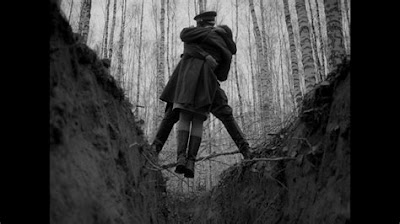 |
That officer, while grateful for the intel, decides that Ivan has done enough for the war effort and should be shipped back to school to be with all the other children. Ivan, who's done a mass of growing up under these circumstances, just wants another mission. His family have been killed by the Germans. On one of the walls of the bunker where he is quartered is a message from doomed prisoners of the Nazis which ends in the words: avenge us. Ivan really did already have a sense of vocation before that but now it's a compulsion.
As far as plotted timelines go that's pretty much it. The rest is Tarkovsky who, in his debut feature, is announcing his entrance into world cinema. It's a Soviet-era war film from before the thaw and all it had to be was a wrenching tale of heroism. The Russian experience of World War II which they still refer to as the Great Patriotic War, is about the as personal as any invasion gets. The Germans moved through it like butter for the first year until it was turned around but their conduct was almost entirely criminal and done under the idea that they were conquering a subhuman race. If that doesn't create the angriest army in history I don't know what will.
There's no ambiguity about that in this film but there is also no propagandist hysteria. We already have a good idea of what the land has gone through and, if anything, already feel impatient at seeing so much day to day organisation among the good guys that we as viewers want them to get on with it. But this is every frame a Tarkovsky tale and what we see is the grim poetry of the longer game. We feel as impatient as Ivan but the soldiers know that wars are won with movement of supplies as well as troops and there will always be waiting. The constant flare lights that fall from the evening sky remind us that anyone on the surface of the lake is a target but they also give us pause to the dangerous beauty of warfare. An eerie scene in a birch forest between Captain Kholin and Masha the nurse where their flirting in full uniform among the tall, thin silvery birch trunks does not allow a moment's escape from the violence that surrounds them even when it makes no sound of its own. The scene is left unconsummated and, if returned to later, is left below the priorities of military order. That's about as heroic as Tarkovsky allows us.
Well, until the end where, at the liberation of Berlin at the end of the war, we learn the fate of Ivan whom we last saw disappearing into the night on another mission years before. The Soviet soldiers are going through the records of prisoners that the Germans have executed among the rubble, the nooses on beams and even a home fashioned guillotine. One face stares out from the many files among the rubble.
We end again in one of Ivan's fantasy scenes or dream sequences. It's like the previous one where he and his sister are riding on the back of a truck laden with apples and the background is unnervingly in the negative. This time is more like the opening. Ivan and his friends are playing at the beach. He runs along with one of them (who might be his sister) right to the water and onwards. The image, for its beauty and the innocence that not even the worst he knew could erase, is possibly the last thing that went through his mind: it will freeze your heart and shatter it to tiny pieces.
This film is second only to the also Soviet Come and See by Elem Klimov from 1987 which is one of the most devastating and uplifting films about war I've ever seen. Ivan's Childhood, for all its comparative subtlety, recalls at least the beauty and the joy of why fighting Nazis was important, not just the cruelty that borders on the surreal and refuses to be forgotten but the sliver splashing of children enjoying play.
No comments:
Post a Comment